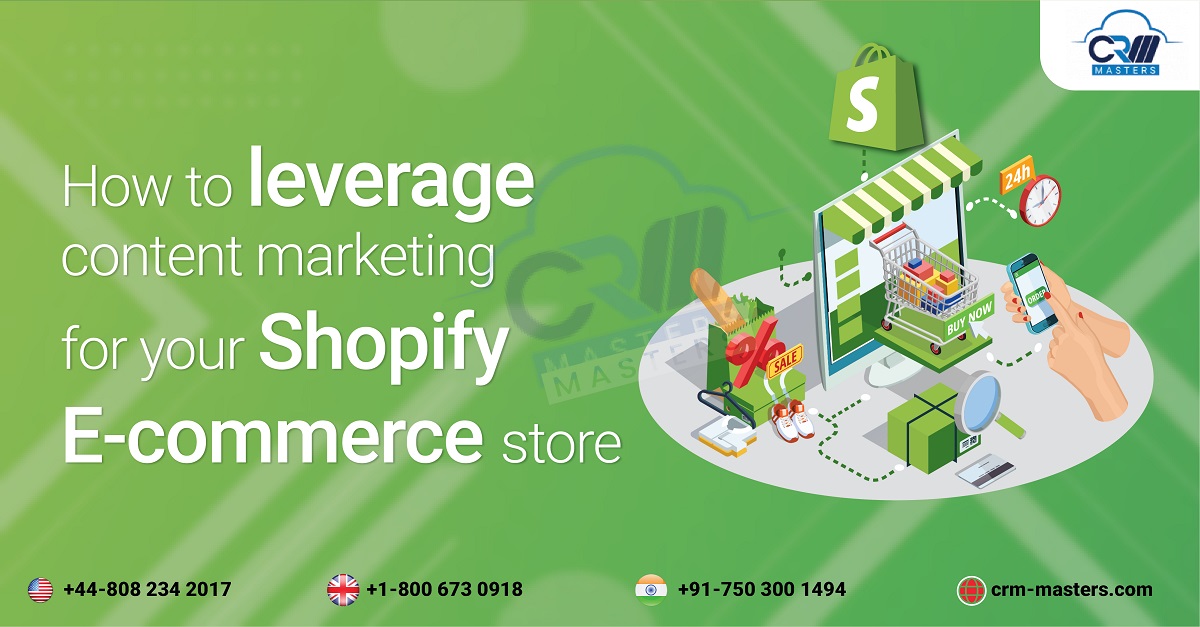
How to Leverage Content Marketing for Your Shopify E-Commerce Store
Customers are spending online time more than ever before, this is where the marketing messages are competing in the market to grab their attention. Nowadays, digital channels as well as content types, everything is evolved and growing in numbers.
Traditional ways of marketing are no longer effective, this is where the new ways of content marketing work. For a brand to be trusted, it needs to provide customers something worthwhile.
Content marketing helps your brand build consumer’s trust. Let’s find out, what is content marketing and how it works for your Shopify E-commerce store.
What is Content Marketing?
Using material as a means of establishing credibility with your audience is known as content marketing. Rather than attempting to convince people to purchase from you through advertising strategies, content marketing leverages your business’s experience to benefit your client.
You can establish enduring relationships with customers by producing content that offers a distinct viewpoint and level of expertise that they can’t get elsewhere.
Your content marketing strategy allows you to engage customers at every stage of their journey.
Here’s how it works:
- Develop interesting content material for social media such as Instagram, Facebook, LinkedIn, etc.
- Post videos content on platforms like YouTube where users can watch videos and gain valuable insights.
- Post and update website content that has been optimized to rank highly in search results.
Types of Content Used for Marketing
In content marketing, “online content” refers to any information you share digitally, whether it’s written text, audio like podcasts, or visuals like infographics. This content can be distributed on your website, social media, email, and other online channels.
Let’s explore some types of content marketing:
-
Blog Power
Blogs are a popular content marketing tool. By creating blog posts or articles that answer common questions your audience has (FAQs), you can attract them to your website and build trust. These blogs can be long or short, but the goal is to create content that ranks well for search terms your ideal customer might use.
-
B2B vs. B2C Marketing
B2B content marketing targets working professionals. Companies selling products or services to other businesses use this approach to boost brand awareness, website traffic, leads, and sales. Since B2B buying cycles are longer and involve higher costs, content often focuses on valuable resources like research reports or ebooks.
B2C content marketing, on the other hand, aims to create content that helps consumers in their daily lives. It’s often shorter and easier to consume than B2B content, with short articles, videos, and social media posts being the most common formats.
-
E-commerce Content Marketing
E-commerce content marketing focuses on using digital channels to boost online sales. This content marketing is generally performed digitally.
-
Interactive Content Marketing
Content marketing isn’t just about passively consumed information. You can create interactive content that your audience co-creates with you. This could involve quizzes they can take or downloadable materials they can fill out with their email IDs.
As an example, you may create a quiz to measure ‘IQ level’, and ask for their email address to reveal the answers after the test is completed.
-
Infographics
Infographics are a visual way to break down complicated information. They’re designed to be clear, engaging, and easy to share. You can use them to repackage existing content like reports or explainer videos for a new audience or channel.
-
Video Content Marketing
Videos allow you to connect with customers on a deeper level than other content types. They showcase your brand’s personality, expertise, and understanding of your audience’s needs. Videos perform well across various platforms, YouTube remains a popular platform for longer videos but is now offering its short-form content option called Shorts.
-
Social Media Content Marketing
Social media is more than just a content distribution channel. It allows you to customize content to each platform’s audience and preferences. You can ask your audience questions, initiate conversations, and boost your brand through your fans.
Need a Shopify Expert?
Using content marketing can greatly improve your Shopify store by bringing in more visitors, engaging potential customers, and boosting sales. The key steps are understanding your audience, planning your content, optimizing for search engines, promoting across various channels, and regularly checking your results.
At CRM Masters Infotech, we specialize in Shopify websites and aim to help businesses grow online. Contact us to learn how we can help you use content marketing to drive your eCommerce success.






